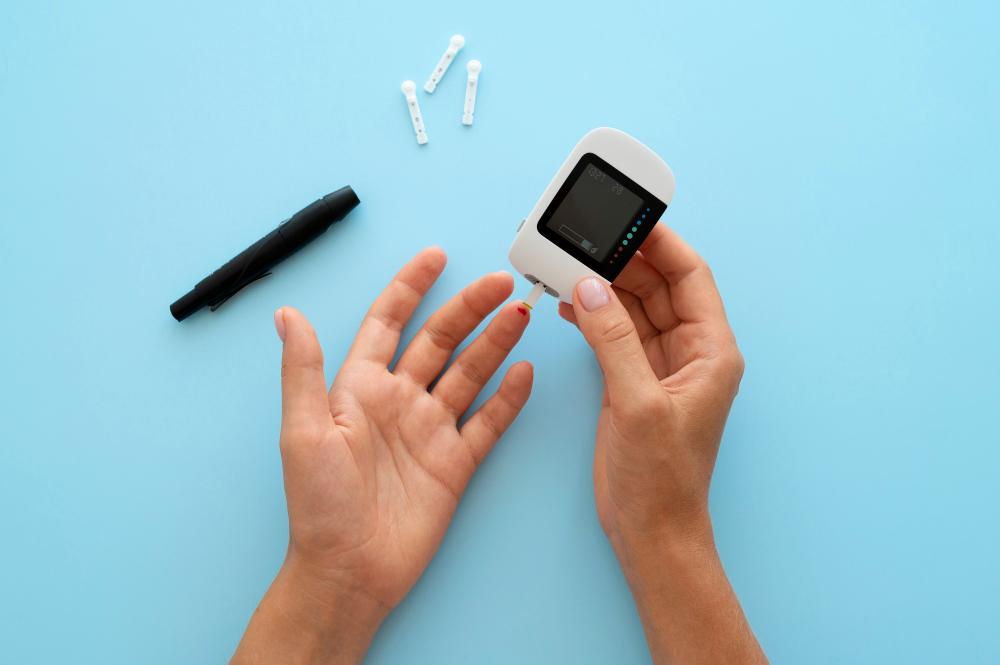A blood glucose test is an important process to measure the sugar levels in the blood. It helps to figure out if someone has diabetes and at what level the treatment should be started.
But the results can be changed by a number of things. You can keep your blood glucose levels at their optimal conditions by getting accurate results. Here are the following factors that can affect your blood glucose test accuracy:
- Fasting status: Even a tiny food or beverage (other than water) can cause your blood sugar levels to rise. The test requires you to fast for at least eight hours. So, the test for blood sugar will show a higher reading than it should.
- Timing after meals: After carbohydrate consumption, random, non-fasting blood sugar tests frequently show high blood sugar. What, how much, and what kind of food you eat matter. The blood glucose test results depend on when you last ate.
- Oral glucose tolerance test (OGTT) influences: The OGTT protocol involves fasting blood, consuming a glucose solution, and additional samples after one or two hours. Blood Glucose Test results will be off if you consume anything during the test or don’t wait long enough.
- Medications & supplements: Certain supplements may work. If you use medicine, tell your doctor before your Blood Glucose Test.
- Stress, illness, or infection: Physical stress (such as surgery), infection, or illness can boost blood sugar without eating. This can alter blood glucose test results, raising them over normal.
- Exercise levels: Pre-test exercise lowers blood sugar. Intense activity may briefly elevate it. Physical activity before a blood glucose test matters.
- Hydration state: Dehydration changes glucose levels by raising the blood concentration. More correct numbers come from being well-hydrated.
- Slow or difficult blood draws: Blood glucose measurements might be affected by difficult blood sampling or inadequate blood-pricking. The approach affects the Blood Glucose Test.
- Storage and handling of the sample: The accuracy of test results also depends on the sample collection and handling. It is important to take care of several facts while collecting the blood sample, the storage temperature of the blood sample.
- Presence of other substances in blood: Laboratory and meter glucose measurement can be affected by high blood fat, bilirubin, or other factors.
Why Accuracy Matters
The following reasons make correct blood glucose test results essential:
- They serve in the diagnosis of diabetes, pre-diabetes, and gestational diabetes.
- They influence treatment strategies since those numbers often influence lifestyle, pharmaceutical, and food changes.
- False comfort or undue tension may result from readings that are too favourable or negative.
How to Improve Accuracy
To ensure the highest level of accuracy in blood glucose test readings:
- You need to follow the proper instructions.
- Do not eat or drink except water before your random test.
- Please disclose the wellness products or supplements you take.
- Try to fit tests in around lunch or other activities if at all possible.
- Remain hydrated.
- Unless your doctor instructs you otherwise, refrain from doing any intense exercise just before the test.
- Verify the lab’s or your meter’s credibility and upkeep.
Conclusion
Blood glucose testing is an effective method; however, its effectiveness depends on the surrounding circumstances. Results can change due to a variety of common reasons. You and your physician can more accurately interpret your readings if you are aware of what those are.
Flinders Discount Chemist provides blood glucose tests as part of its preventative care services if you’re searching for trustworthy assistance. To assist you in achieving precise outcomes, they incorporate expert care, quality education, and services. Their team is an excellent place to start if you need assistance or want their recommendations.




